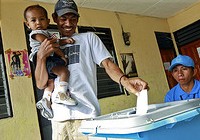
The Report of the Global Commission on Elections, Democracy and Security identified building professional, competent electoral management bodies (EMBs) as one of the five major challenges that must be overcome to conduct elections with integrity.
There is more to it, though. East Timor, for example, has EMBs. And it has made demonstrable progress in its elections since independence. But its EMBs still need help.
East Timor gained independence in 2002 after three years of UN administration, which followed more than two decades of guerrilla warfare during Indonesian rule. This year, the East Timorese voted in their country’s third parliamentary election since independence – the first to be run by the East Timorese themselves. The East Timorese also participated in two rounds of presidential elections this year, which resulted in the replacement of Jose Ramos-Horta with former military leader Taur Matan Ruak.
The three elections proceeded relatively smoothly and without significant evidence of the vote-buying, intimidation, and other forms of corruption at the polling centres which marred elections in 2001 and 2007. Moreover, official participation in the national election was 74 percent. In a poor country without compulsory voting, this is a major achievement in the maturing of East Timor’s democracy and its EMBs – the Technical Secretariat for Electoral Administration and the National Electoral Commission – deserve much of the credit for this.
However, it was clear to invited international observers that the authorities were overstretched throughout the election periods. For East Timor to continue on this positive democratic trend, away from the problematic elections of the past, its EMBs need ongoing support.

First, they require ongoing professional assistance to train electoral staff and build institutional capacity. Ahead of this year’s elections, the Australian Electoral Commission as well as UNDP provided extensive training to local officials on the running of elections, including on polling coordination and communication techniques. But these assistance programs are soon due to end, and the authorities still do not have sufficient professional capacity to be self-sufficient and to conduct their own training of future election officials.
Second, they require practical assistance. Voting in East Timor is a difficult exercise. Under the country’s electoral laws, voters are required to vote in the districts where they registered. Without postal voting, thousands of people can vote only by travelling from the capital, Dili (where they have moved for work) to their hometowns and villages in rural areas (where they are registered). This often involves an arduous journey on poorly maintained roads. It is also very costly. An important point when 40 percent of East Timorese still live below the international poverty line. Although turnout was high, the 2012 national election was special, both in marking 10 years since independence and the country’s first nationally run election. There is no guarantee such high levels of participation will continue in the face of high barriers to participation.
Other minor but significant problems also hampered the election. Examples include ballot papers being spoiled by weather due to the flimsy construction of polling stations and poor quality indelible ink (in which voters were required to dip their index fingers on leaving polling booths) resulting in some double-voting. The East Timorese authorities are doing their best, but ongoing international assistance is also required to help remove barriers to participation by expanding the reach of EMBs into rural areas and increasing access to voting facilities.
At least with respect to elections, East Timor is a kernel of democratic promise in the Asia Pacific region. While it is well-recognized that elections are but one step on the way to deepening democracy, it would be a great shame if ongoing international assistance for its EMBs were withdrawn at the very time when they have demonstrated such promise, but also a need for further assistance to improve the quality of elections in East Timor.
Charles Deutscher is an MPP student at the Blavatnik School of Government, Oxford.
This post is part of our Deepening Democracy series, responding to a September 2012 report by the Global Commission on Elections, Democracy and Security, on improving the integrity of elections. The series is being curated by the Blavatnik School of Government and hosted on Politics in Spires. It features contributions from students on the Master of Public Policy course at the Blavatnik School, as well as guest posts from Oxford and Cambridge scholars in politics and international relations.




No Comment